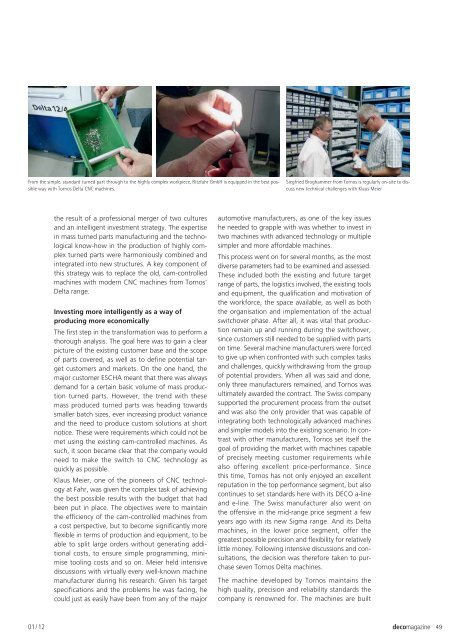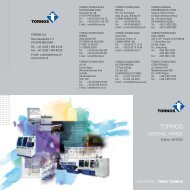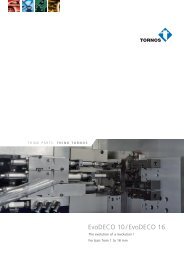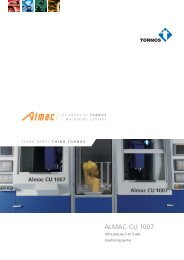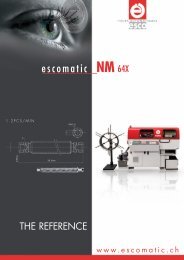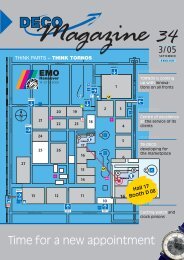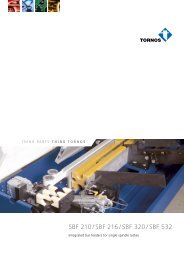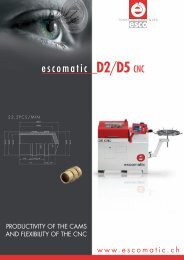Issue 60 - Tornos
Issue 60 - Tornos
Issue 60 - Tornos
- No tags were found...
Create successful ePaper yourself
Turn your PDF publications into a flip-book with our unique Google optimized e-Paper software.
From the simple, standard turned part through to the highly complex workpiece, Ritzfahr GmbH is equipped in the best possibleway with <strong>Tornos</strong> Delta CNC machines.Siegfried Broghammer from <strong>Tornos</strong> is regularly on-site to discussnew technical challenges with Klaus Meierthe result of a professional merger of two culturesand an intelligent investment strategy. The expertisein mass turned parts manufacturing and the technologicalknow-how in the production of highly complexturned parts were harmoniously combined andintegrated into new structures. A key component ofthis strategy was to replace the old, cam-controlledmachines with modern CNC machines from <strong>Tornos</strong>’Delta range.Investing more intelligently as a way ofproducing more economicallyThe first step in the transformation was to perform athorough analysis. The goal here was to gain a clearpicture of the existing customer base and the scopeof parts covered, as well as to define potential targetcustomers and markets. On the one hand, themajor customer ESCHA meant that there was alwaysdemand for a certain basic volume of mass productionturned parts. However, the trend with thesemass produced turned parts was heading towardssmaller batch sizes, ever increasing product varianceand the need to produce custom solutions at shortnotice. These were requirements which could not bemet using the existing cam-controlled machines. Assuch, it soon became clear that the company wouldneed to make the switch to CNC technology asquickly as possible.Klaus Meier, one of the pioneers of CNC technologyat Fahr, was given the complex task of achievingthe best possible results with the budget that hadbeen put in place. The objectives were to maintainthe efficiency of the cam-controlled machines froma cost perspective, but to become significantly moreflexible in terms of production and equipment, to beable to split large orders without generating additionalcosts, to ensure simple programming, minimisetooling costs and so on. Meier held intensivediscussions with virtually every well-known machinemanufacturer during his research. Given his targetspecifications and the problems he was facing, hecould just as easily have been from any of the majorautomotive manufacturers, as one of the key issueshe needed to grapple with was whether to invest intwo machines with advanced technology or multiplesimpler and more affordable machines.This process went on for several months, as the mostdiverse parameters had to be examined and assessed.These included both the existing and future targetrange of parts, the logistics involved, the existing toolsand equipment, the qualification and motivation ofthe workforce, the space available, as well as boththe organisation and implementation of the actualswitchover phase. After all, it was vital that productionremain up and running during the switchover,since customers still needed to be supplied with partson time. Several machine manufacturers were forcedto give up when confronted with such complex tasksand challenges, quickly withdrawing from the groupof potential providers. When all was said and done,only three manufacturers remained, and <strong>Tornos</strong> wasultimately awarded the contract. The Swiss companysupported the procurement process from the outsetand was also the only provider that was capable ofintegrating both technologically advanced machinesand simpler models into the existing scenario. In contrastwith other manufacturers, <strong>Tornos</strong> set itself thegoal of providing the market with machines capableof precisely meeting customer requirements whilealso offering excellent price-performance. Sincethis time, <strong>Tornos</strong> has not only enjoyed an excellentreputation in the top performance segment, but alsocontinues to set standards here with its DECO a-lineand e-line. The Swiss manufacturer also went onthe offensive in the mid-range price segment a fewyears ago with its new Sigma range. And its Deltamachines, in the lower price segment, offer thegreatest possible precision and flexibility for relativelylittle money. Following intensive discussions and consultations,the decision was therefore taken to purchaseseven <strong>Tornos</strong> Delta machines.The machine developed by <strong>Tornos</strong> maintains thehigh quality, precision and reliability standards thecompany is renowned for. The machines are built01 / 12 decomagazine 49


